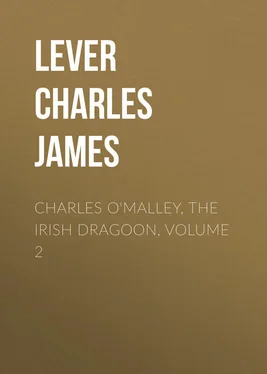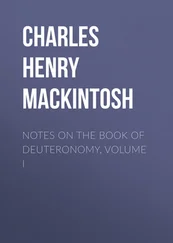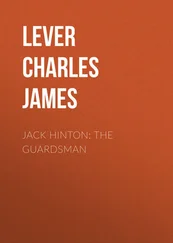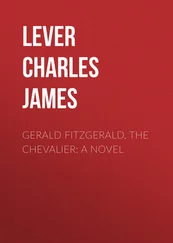Charles Lever - Charles O'Malley, The Irish Dragoon, Volume 2
Здесь есть возможность читать онлайн «Charles Lever - Charles O'Malley, The Irish Dragoon, Volume 2» — ознакомительный отрывок электронной книги совершенно бесплатно, а после прочтения отрывка купить полную версию. В некоторых случаях можно слушать аудио, скачать через торрент в формате fb2 и присутствует краткое содержание. Издательство: Иностранный паблик, Жанр: literature_19, foreign_antique, foreign_prose, на английском языке. Описание произведения, (предисловие) а так же отзывы посетителей доступны на портале библиотеки ЛибКат.
- Название:Charles O'Malley, The Irish Dragoon, Volume 2
- Автор:
- Издательство:Иностранный паблик
- Жанр:
- Год:неизвестен
- ISBN:нет данных
- Рейтинг книги:5 / 5. Голосов: 1
-
Избранное:Добавить в избранное
- Отзывы:
-
Ваша оценка:
- 100
- 1
- 2
- 3
- 4
- 5
Charles O'Malley, The Irish Dragoon, Volume 2: краткое содержание, описание и аннотация
Предлагаем к чтению аннотацию, описание, краткое содержание или предисловие (зависит от того, что написал сам автор книги «Charles O'Malley, The Irish Dragoon, Volume 2»). Если вы не нашли необходимую информацию о книге — напишите в комментариях, мы постараемся отыскать её.
Charles O'Malley, The Irish Dragoon, Volume 2 — читать онлайн ознакомительный отрывок
Ниже представлен текст книги, разбитый по страницам. Система сохранения места последней прочитанной страницы, позволяет с удобством читать онлайн бесплатно книгу «Charles O'Malley, The Irish Dragoon, Volume 2», без необходимости каждый раз заново искать на чём Вы остановились. Поставьте закладку, и сможете в любой момент перейти на страницу, на которой закончили чтение.
Интервал:
Закладка:
“But Mike, if you indulge much longer in this flattering recollection of your father, I’m afraid we shall lose sight of the ghost entirely.”
“No fear in life, your honor; I’m coming to him now. Well, it was this way it happened: In the winter of the great frost, about forty-two or forty-three years ago, the ould priest of Tullonghmurray took ill and died. He was sixty years priest of the parish, and mightily beloved by all the people, and good reason for it; a pleasanter man, and a more social crayture never lived, – ‘twas himself was the life of the whole country-side. A wedding nor a christening wasn’t lucky av he wasn’t there, sitting at the top of the table, with may be his arm round the bride herself, or the baby on his lap, a smoking jug of punch before him, and as much kindness in his eye as would make the fortunes of twenty hypocrites if they had it among them. And then he was so good to the poor; the Priory was always so full of ould men and ould women sitting around the big fire in the kitchen that the cook could hardly get near it. There they were, eating their meals and burning their shins till they were speckled like a trout’s back, and grumbling all the time; but Father Dwyer liked them, and he would have them.
“‘Where have they to go,’ he’d say, ‘av it wasn’t to me? Give Molly Kinshela a lock of that bacon. Tim, it’s a could morning; will ye have a taste of the “dew?”’
“Ah, that’s the way he’d spake to them; but sure goodness is no warrant for living, any more than devilment, and so he got could in his feet at a station, and he rode home in the heavy snow without his big coat, – for he gave it away to a blind man on the road; in three days he was dead.
“I see you’re getting impatient, so I’ll not stop to say what grief was in the parish when it was known; but troth, there never was seen the like before, – not a crayture would lift a spade for two days, and there was more whiskey sold in that time than at the whole spring fair. Well, on the third day the funeral set out, and never was the equal of it in them parts: first, there was my father, – he came special from Cork with the six horses all in new black, and plumes like little poplar-trees, – then came Father Dwyer, followed by the two coadjutors in beautiful surplices, walking bare-headed, with the little boys of the Priory school, two-and-two.”
“Well, Mike, I’m sure it was very fine; but for Heaven’s sake, spare me all these descriptions, and get on to the ghost!”
“‘Faith, yer honor’s in a great hurry for the ghost, – may be ye won’t like him when ye have him; but I’ll go faster, if ye please. Well, Father Dwyer, ye see, was born at Aghan-lish, of an ould family, and he left it in his will that he was to be buried in the family vault; and as Aghan-lish was eighteen miles up the mountains, it was getting late when they drew near. By that time the great procession was all broke up and gone home. The coadjutors stopped to dine at the ‘Blue Bellows’ at the cross-roads; the little boys took to pelting snowballs; there was a fight or two on the way besides, – and in fact, except an ould deaf fellow that my father took to mind the horses, he was quite alone. Not that he minded that same; for when the crowd was gone, my father began to sing a droll song, and told the deaf chap that it was a lamentation. At last they came in sight of Aghan-lish. It was a lonesome, melancholy-looking place with nothing near it except two or three ould fir-trees and a small slated house with one window, where the sexton lived, and even that was shut up and a padlock on the door. Well, my father was not over much pleased at the look of matters; but as he was never hard put to what to do, he managed to get the coffin into the vestry, and then when he had unharnessed the horses, he sent the deaf fellow with them down to the village to tell the priest that the corpse was there, and to come up early in the morning and perform Mass. The next thing to do was to make himself comfortable for the night; and then he made a roaring fire on the ould hearth, – for there was plenty of bog-fir there, – closed the windows with the black cloaks, and wrapping two round himself, he sat down to cook a little supper he brought with him in case of need.
“Well, you may think it was melancholy enough to pass the night up there alone with a corpse, in an ould ruined church in the middle of the mountains, the wind howling about on every side, and the snowdrift beating against the walls; but as the fire burned brightly, and the little plate of rashers and eggs smoked temptingly before him, my father mixed a jug of the strongest punch, and sat down as happy as a king. As long as he was eating away he had no time to be thinking of anything else; but when all was done, and he looked about him, he began to feel very low and melancholy in his heart. There was the great black coffin on three chairs in one corner; and then the mourning cloaks that he had stuck up against the windows moved backward and forward like living things; and outside, the wild cry of the plover as he flew past, and the night-owl sitting in a nook of the old church. ‘I wish it was morning, anyhow,’ said my father, ‘for this is a lonesome place to be in; and faix, he’ll be a cunning fellow that catches me passing the night this way again.’ Now there was one thing distressed him most of all, – my father used always to make fun of the ghosts and sperits the neighbors would tell of, pretending there was no such thing; and now the thought came to him, ‘May be they’ll revenge themselves on me to-night when they have me up here alone;’ and with that he made another jug stronger than the first, and tried to remember a few prayers in case of need, but somehow his mind was not too clear, and he said afterwards he was always mixing up ould songs and toasts with the prayers, and when he thought he had just got hold of a beautiful psalm, it would turn out to be ‘Tatter Jack Walsh’ or ‘Limping James’ or something like that. The storm, meanwhile, was rising every moment, and parts of the old abbey were falling as the wind shook the ruin; and my father’s spirits, notwithstanding the punch, wore lower than ever.
“‘I made it too weak,’ said he, as he set to work on a new jorum; and troth, this time that was not the fault of it, for the first sup nearly choked him.
“‘Ah,’ said he, now, ‘I knew what it was; this is like the thing; and Mr. Free, you are beginning to feel easy and comfortable. Pass the jar. Your very good health and song. I’m a little hoarse, it’s true, but if the company will excuse – ’
“And then he began knocking on the table with his knuckles, as if there was a room full of people asking him to sing. In short, my father was drunk as a fiddler; the last brew finished him; and he began roaring away all kinds of droll songs, and telling all manner of stories as if he was at a great party.
“While he was capering this way about the room, he knocked down his hat, and with it a pack of cards he put into it before leaving home, for he was mighty fond of a game.
“‘Will ye take a hand, Mr. Free?’ said he, as he gathered them up and sat down beside the fire.
“‘I’m convanient,’ said he, and began dealing out as if there was a partner fornenst him.
“When my father used to get this far in the story, he became very confused. He says that once or twice he mistook the liquor, and took a pull at the bottle of poteen instead of the punch; and the last thing he remembers was asking poor Father Dwyer if he would draw near to the fire, and not be lying there near the door.
“With that he slipped down on the ground and fell fast asleep. How long he lay that way he could never tell. When he awoke and looked up, his hair nearly stood on an end with fright. What do you think he seen fornenst him, sitting at the other side of the fire, but Father Dwyer himself. There he was, divil a lie in it, wrapped up in one of the mourning cloaks, trying to warm his hands at the fire. “‘ Salve hoc nomine patri! ’ said my father, crossing himself, ‘av it’s your ghost, God presarve me!’
Читать дальшеИнтервал:
Закладка:
Похожие книги на «Charles O'Malley, The Irish Dragoon, Volume 2»
Представляем Вашему вниманию похожие книги на «Charles O'Malley, The Irish Dragoon, Volume 2» списком для выбора. Мы отобрали схожую по названию и смыслу литературу в надежде предоставить читателям больше вариантов отыскать новые, интересные, ещё непрочитанные произведения.
Обсуждение, отзывы о книге «Charles O'Malley, The Irish Dragoon, Volume 2» и просто собственные мнения читателей. Оставьте ваши комментарии, напишите, что Вы думаете о произведении, его смысле или главных героях. Укажите что конкретно понравилось, а что нет, и почему Вы так считаете.












